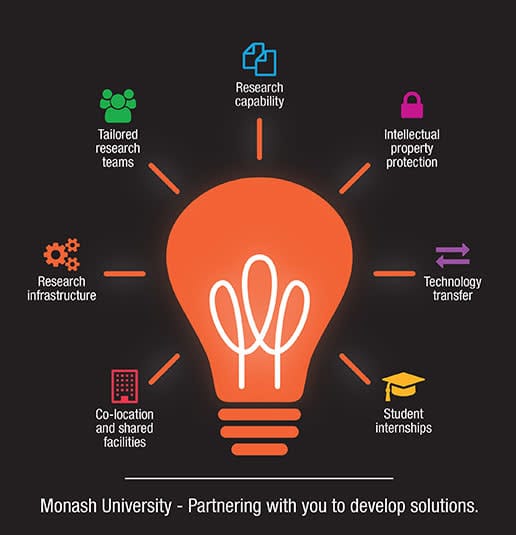
How can a university make sure that people, beyond its students and staff, benefit from its knowledge and presence? More than ever, universities are being called upon to localise their national and international responsibilities.
Monash University’s willingness to reach out, not only to industry and government, but to local and global communities, defines our nature – one that prioritises inclusivity and enterprise for the common good. Monash does not aim to merely play a ‘civic role’; we are deliberately, strategically civic.
We have worked hard to build a community that respects diversity and belonging, not only for our students and staff, but also for our alumni across the world.
Through collaborations with industry and diverse interdisciplinary projects, Monash has continued to increase its prominence and influence in communities in Australia and internationally.

Addressing global concerns
The Monash Law Clinics are an example of a University initiative that has major local impact, but are also addressing global concerns by leveraging the expertise of the Faculty of Law and collaborating with relevant partners and community networks.
Established in 1975, the Monash Law Clinics are legal centres that provide free advice and assistance to members of the community. Across three locations in Melbourne, putting Monash law students under the supervision of qualified lawyers, the clinics aim to help people who are unable to afford or access private legal assistance and representation. From January 2018 to June 2019, more than 10,000 people in Melbourne received legal advice or representation on matters such as motor vehicle accidents, fines and infringements, and issues relating to criminal law. They are also teaching clinics, as those students get direct feedback on how to be effective practitioners.
The clinics have been significantly expanded in the past year, also adding a Melbourne CBD location. This has enabled an increase in scope and work to be undertaken on a range of important new projects. The Anti Death Penalty Institute, a partnership between the Monash law faculty and the Capital Punishment Justice Project (formerly Reprieve Australia), provides a regional hub for policy, research, advocacy and casework devoted to the abolition of the death penalty in the Southeast Asian region and elsewhere.
Related: Death knell: taking a stand to abolish capital punishment
In July, the faculty launched clinics in climate defence, human trafficking and modern slavery, designed to examine and evaluate the evolution of the international law response to these global issues, including the human rights implications, and those of criminal justice, gender, labour, migration and race. Other clinics include those of law reform and international trade law. These are vitally important matters on an international scale.
The Monash Technology Precinct, the industry and employment hub surrounding the Clayton campus, is an integral part of our engagement and enterprise strategy. Our partnerships with world-leading companies such as Johnson & Johnson, Pfizer, Woodside, Bosch Australia and Agilent Technologies are part of the collaborative environment of the precinct, which, just like the Monash Law Clinics, delivers local outcomes as well as finding innovative solutions to global challenges.
The David Winston Turner Endowment Fund has made the largest single gift to the field of mental health in Australia. This remarkable act of philanthropy has established The Turner Institute for Brain and Mental Health, which will significantly improve many people’s lives through working on discovery and clinical impact for mental health disorders. Nearby, the Victorian Heart Hospital, currently under construction, will be one of just a few specialist cardiac hospitals worldwide located in a research precinct.
Related: Innovation and collaboration cornerstones of Australia's first dedicated heart hospital
Impacting communities internationally
We are also making an impact on communities through our international campuses and partnerships.
In May, the University launched the Monash Technology Transformation Institute (MTTI). This was acknowledged as an historic initiative for collaboration in innovation and trade between Australia and China. The partnership will enable Monash to rapidly progress early-stage intellectual property from among our researchers’ outstanding medicine, medical device, materials, engineering and other discoveries.
The IITB-Monash Research Academy in Mumbai, the Monash-Southeast University in Suzhou, and Monash Malaysia continue to thrive as research-intensive partnerships offering education as well as research at top 100-ranked university standard outside Monash’s Australian base. Our presences in Prato, Italy and Indonesia offer students, staff and alumni opportunities to engage in locally based research and events, and develop their industry and community networks.
We have worked hard to build a community that respects diversity and belonging, not only for our students and staff, but also for our alumni across the world.
Our industry engagement is looking to build longer-term partnerships to explore applications of research and education that deliver new benefits, and build new ecosystems around us. And our international profile is more than the diversity of our students and staff, but also a research-intensive network of campuses that provides opportunities to develop our understanding and engagement in those countries – China, India, Indonesia and Malaysia – and in our region.





